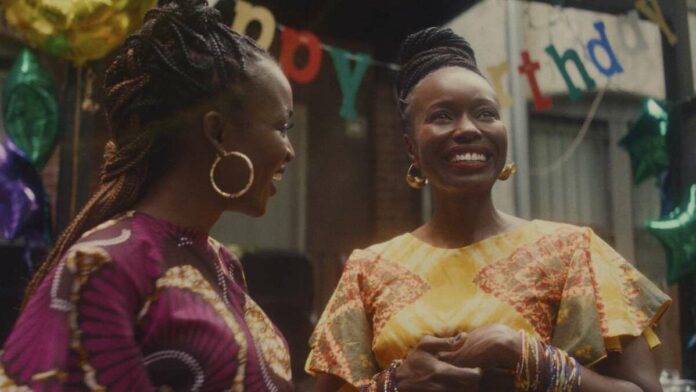Nikyatu Jusu’s directorial debut, “Nanny,” is a unique and masterfully crafted film about the lives and struggles of immigrants (specifically Senegalese immigrants) in America interwoven with mother-child intuition. Oftentimes, trailers and marketing for a film can tamper with the expectations of an audience and ignite a different idea for a movie that may not be what it actually is. Do not go into “Nanny” hoping to have your heart in your mouth or being scared out of your wits because, as with many “horror” movies of recent years, specifically after the pandemic, it breaks the bounds of “horror” and includes social commentary and Senegalese folklore to tell a fairly predictable tale of separation from a loved one. “Nanny” specifically stands out amongst the African diaspora’s psychological thrillers of recent years, such as Jordan Peele’s directorial, “Candyman,” or “His House” because of its deviance from the subject of oppression. Visually, “Nanny” is one of the most mesmerizing movies of the year, with incredible usage of lights, special effects, camera work and sound design that will make your jaw drop more than once. My biggest qualm with “Nanny” is that it incorporates cultural nuance into this previously told story but shies away from using it to its full potential, leaving many unanswered questions. Not to say it’s not an enjoyable movie, “Nanny” manages to keep you in a chokehold from beginning to end even when you know what’s coming, owing rightfully to a stellar performance by lead actress Anna Diop, incredible direction by Nikyatu in collaboration with fantastic cinematographer, Rina Yang who brings the picture to life.
The story follows a young Senegalese woman named Aisha, who is living in America and finds a job as a nanny for a white family. The daughter, Rose, immediately takes a liking to her. Aisha has taken up this job to bring her son Lamine to the US, whom she hasn’t seen in almost a year. Malik works as a guard in the same building, and the two start a budding romance as well, finally giving Aisha some happiness. Slowly, though, things start to get a bit strange as Aisha finds herself in the presence of something otherworldly. Unable to understand what this paranormal creature wants from her; she finds herself lost between what’s real and what’s in her mind. Giving us a strong black woman as the lead of this film is already a win-win situation for all things pop culture, and for that alone, you must watch this film.
“Mama” might’ve been a more apt title for this film because it tells the story of a desperate mother before all else. Jusu seamlessly shows us parallels between Aisha and Amy (Rose’s mom), immersing us in the journey of motherhood from different vantage points. To me, Aisha’s story could be about the “bad feeling” of a mother or the maternal intuition that mothers have about their children throughout their lives. Aisha’s suffocating dreams leave us breathless (maybe in awe of the scene too) and wondering what may be the cause of her worries. The Mami Wata (the water spirit that “haunts” Aisha) is the source of Aisha’s worst anxieties, taking the form of an ancient African tale of a beautiful mermaid-like creature who gives Aisha visions and submerges her in what seems to be a premonition. Every scene in which water is involved is a painting that is a magical viewing experience that drenches you with darkness, sorrow or even lights through the film, almost making Aisha – a vessel of the element. Water is also a part of childbirth, and one can argue that its many layers could be compared to the layers of immigrant life in America and is the ‘help.’
“Nanny” sets out to be a devastating slow burn but falls short in delivering a “gut-punching” ending. We empathize with Aisha throughout the movie and try to find answers along with her (rather easily), only to be rushed into an ending that may have been much more harrowing had it been executed differently. Not to say that only convoluted psychological thrillers can be appreciated. The incredible usage of water and “reflection” throughout the film is an absolute delight to watch and is the reason we continue to stay in our seats, but it’s also what makes the eerie folklore seem like just a plot device that didn’t even have to be a part of the story. What “Nanny” instead shines a light on is the immigrant lifestyle of African caregivers and brings to light many problems in the system in an effective manner that needs to be viewed by everybody. The American dream is never pretty doll houses and fancy cars with perfect jobs for immigrants. The entire cast gives fantastically believable performances, and Anna Diop is a force to be reckoned with. Leslie Uggams’ character is definitely the most interesting one in the movie besides Aisha, but she is underutilized in the fact that we would’ve loved to know more about what she does and how she can help Aisha. The chemistry between Aisha and Malik is tantalizing and provides one of the best visual sequences of the movie. On the scare-o-meter, there are certain scenes in “Nanny” that are anxiety-inducing, but the overall fear level is about 4 out of 10. Jusu has immense potential and has begun her filmography with a bang, leaving us with anticipation for her next work. I think with every watch, there is more to unpack with “Nanny” and get deeper into the “waters” of this world.
Nikyatu Jusu’s film, “Nanny” is streaming on Amazon Prime Video with subtitles.

